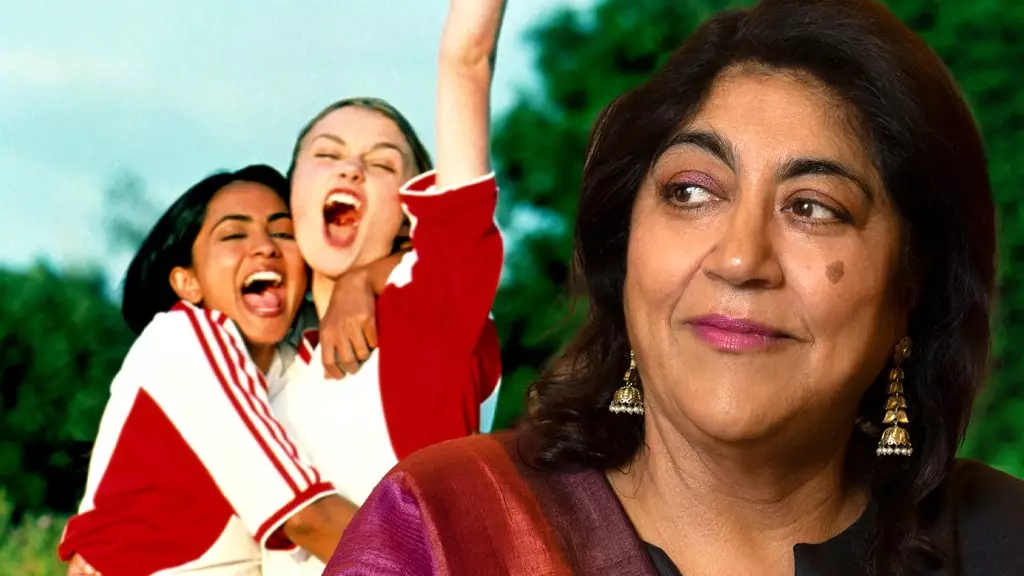The announcement that Gurinder Chadha is developing a sequel to her iconic 2002 film, *Bend It Like Beckham*, signals more than just a nostalgic revisit; it heralds a significant cultural reinvigoration of women’s football and the stories that empower young women worldwide. Chadha’s intention to bring back familiar characters—played by Parminder Nagra, Keira Knightley, and others—reflects a desire not only to extend a beloved narrative but also to underline the ongoing evolution of female athletes’ visibility and influence. Her promise hinges on crafting a compelling script that does justice to the original characters’ arcs, ensuring that the sequel becomes a meaningful addition rather than a mere commercial follow-up.
A critical aspect of this revival is Chadha’s firm focus on authenticity. She recognizes that the response from cast members will depend heavily on whether the screenplay resonates with their expectations and artistic integrity. This approach highlights her commitment to storytelling rooted in respect for the characters’ journeys, and by extension, the real-life stories of women in sports. The idea of reigniting this franchise, timed to coincide with the 25th anniversary of the original film, underscores how stars aligning around key milestones can serve as catalysts for broader cultural conversations—particularly around women’s football, which is experiencing unprecedented growth.
From Marginalized to Mainstream: Women’s Football at a Crossroads
Since its release, *Bend It Like Beckham* has played a pivotal role in shifting perceptions around women’s sports. Chadha’s narrative was groundbreaking at the time, daring to capture the joys, struggles, and dreams of young women defying societal expectations. Today, her desire to revisit and expand that story takes on even greater significance, given the explosive global popularity of women’s football. The sport has transformed from a marginalized pastime to a commercial powerhouse, attracting millions of fans, sponsorships, and media coverage worldwide.
Chadha’s recent conversations with Emma Hayes—head coach of the US Women’s National Team—are emblematic of the deeper industry shifts. Hayes, who has openly credited *Bend It Like Beckham* with inspiring her journey, reflects how the film has become part of football’s cultural fabric. Her involvement in Chadha’s project signals an authentic desire within the sport to tell stories that celebrate female athletes’ resilience, passion, and professionalism. Such collaborations could redefine how narrative film and sports intersect, creating a fertile ground for diverse stories that challenge stereotypes and elevate the status of women on and off the field.
Furthermore, the film’s influence extends beyond entertainment. The recognition from political figures like Lisa Nandy, who celebrates the film as a cultural touchstone, exemplifies how *Bend It Like Beckham* has become an emblem of British multiculturalism and the power of dreaming beyond societal constraints. Its capacity to inspire generations is no longer limited to cinema; it has contributed tangibly to the ongoing fight for equality in sports, media representation, and societal expectations.
Reimagining Cultural Narratives through Sports and Cinema
Chadha’s intention to craft a sequel that balances “hard-hitting” themes with joy exemplifies her understanding of the dual power of storytelling: to challenge norms while celebrating achievement. Her career trajectory illustrates a consistent effort to use film as a platform for social change—lifting marginalized voices and reframe cultural narratives. She recognizes that her original story was about empowerment—affirming that girls can dream big and defy societal gender roles—and she aims to carry that message forward with renewed vigor.
The cultural imprint of *Bend It Like Beckham* is undeniable. It broke barriers by depicting girls playing football—a sport historically associated with masculinity—without shame or apology. Its impact on women’s sports is profound, inspiring countless girls to pursue their passions regardless of societal stereotypes. The anticipated sequel, set against the backdrop of a rapidly growing women’s football landscape, promises to rekindle that spirit, emphasizing that progress is ongoing and that stories like Jess’s still matter today.
By revisiting these characters and their stories, Chadha not only seeks to entertain but aims to reinforce the importance of representation and resilience. Her narrative is a reminder that behind every success story lies a cultural shift—one that involves courage, perseverance, and the unyielding belief that change is possible. The joy that she envisions for the sequel is an essential element—an antidote to the societal challenges women face—offering hope and a sense of community for viewers across the globe.
The Power of Storytelling in Shaping Future Generations
The original *Bend It Like Beckham* was more than just a film; it was a social phenomenon that helped shift perceptions and influence a generation of women and girls. Its charm lay in its candid, humorous, and heartfelt portrayal of cultural clash and personal ambition. Decades later, Chadha recognizes that telling these stories remains vital, especially as women’s football continues its upward trajectory. The sequel isn’t just about revisiting characters; it’s about affirming that progress requires ongoing dialogue and storytelling — tools that reshape societal attitudes and inspire collective action.
The narrative potential of this project is enormous. It allows creators to address contemporary issues—such as diversity, consent, professional sports challenges, and gender equality—within a familiar framework of friendship, family, and determination. Chadha’s experience and her team’s collaboration with football figures like Hayes give the project authenticity and depth, ensuring it will resonate with fans of the original film and newer audiences eager for stories that reflect today’s realities.
Ultimately, this sequel project exemplifies how cultural artifacts can evolve into catalysts for social change. It’s not just a movie; it’s a declaration that stories about women, sports, and perseverance are universal and timeless. Whether it’s a young girl kicking a ball in Hounslow or a coach leading a national team, Chadha’s work continues to remind us of the power of storytelling to uplift, inspire, and challenge the status quo.

